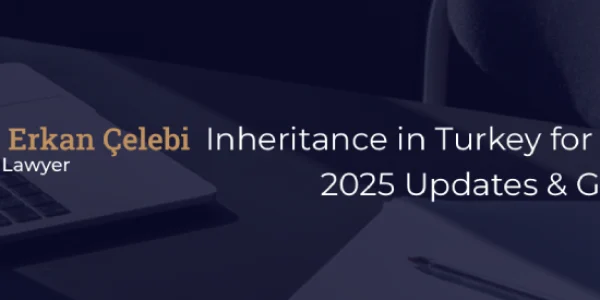What is the Governing Law for the Estate of a Foreigner in Turkey?
In Turkey, foreign nationals and their estates are subject to their own national inheritance law. In other words, if a British national passes away in Turkey, his/her estate is subject to British inheritance laws and is distributed among the heirs as per the British inheritance laws.
The exception to this rule is the real estate in Turkey. Whereas the movable assets in the estate (funds, vehicles, precious metals, personal valuables, furniture etc.) are subject to one’s own national inheritance law, immovable assets in the estate (lands, houses, apartments etc.) are subject to Turkish inheritance laws and are distributed among the heirs as per Turkish succession laws.
What are Turkish Succession Laws?
Under Turkish inheritance laws, unless specified otherwise in a last will and testament, the default distribution of an estate assigns 1/4 to the spouse and the remaining 3/4 is equally divided among the children. In the absence of a living spouse, the children inherit the entire estate, and if there are no children, the current spouse inherits 50% of the estate whereas the parents inherit the remaining 50%.
How Can You Distribute Your Estate Among Heirs?
Just like in any other country, inheritance distribution in Turkey is achieved via a written last will and testament. However, there are legal limits to how much one can alter the legal shares of the heirs. In a last will and testament, the legal shares of the children can be altered only up to half, meaning at least 50% of a child’s legal share is protected unless there is a justifiable reason for further alteration. For a spouse, this percentage ranges from 75% to 100%, indicating that a living spouse’s legal share of the inheritance cannot be significantly modified by the deceased spouse’s will and testament.
Can an inheritance be refused?
Yes, heirs can refuse or disclaim their inheritance within three months starting from the date they become aware of the deceased’s passing. Waiver of inheritance in Turkey is done in writing before a Turkish court.
How Can a Foreigner Claim Inheritance in Turkey?
The initial step in claiming inheritance in Turkey involves petitioning the court to acknowledge you as a legal heir. For non-Turkish citizens, it is essential to furnish the court with pertinent documents enabling it to ascertain the identities of the legal heirs and their respective shares of the estate. Being recognized by a Turkish court as a legal heir is essential before you can proceed to claim and obtain the titles to assets within the estate, whether in full or in part.
Given that identifying the legal heirs of a foreign national involves navigating foreign inheritance laws and documents, it can be a complex task for a Turkish court to accurately determine who the legal heirs are. Thus, foreign nationals seeking to claim an inheritance are strongly recommended to engage a Turkish inheritance lawyer with expertise in inheritance cases. Such a lawyer can aid the court in understanding foreign inheritance laws and facilitate the process of being recognized as a legal heir.
What is the Inheritance Tax in Turkey?
While tax brackets increase yearly, as of 2024 the inheritance tax in Turkey is as follows:
| Tax Brackets | Tax Rates |
| Up to 1.7 Million TL | 1% |
| Between 1.7-5.7 Million TL | 3% |
| Between 5.7-14.4 Million TL | 5% |
| Between 14.4-31.4 Million TL | 7% |
| Anything above 31.4 Million TL | 10% |
Real estate inheritance tax bracket is based on the assessed value of the real estate (Officially assessed by the municipality).
Turkish inheritance tax exemptions are applied to shares of inheritance that are worth up to 1.609.552 TL as of 2024.
Turkey inheritance lawyer Baris Erkan Celebi and his inheritance law firm in Turkey assist foreign nationals with establishing their rights as legal heirs, with the inheritance claim process in Turkey, and obtaining the titles of the assets in the estate. Baris Erkan Celebi also advises on Turkish succession laws and offers assistance with refusing inheritance in Turkey and paying inheritance taxes in Turkey.
HOW TO WRITE A LAST WILL AND TESTAMENT IN TURKEY FOR FOREIGNERS Disclaimer: Do not Write a Will Without Legal Support This article is merely a review of a small portion of Turkish inheritance laws and cannot be construed as a legal advice for anyone’s...








